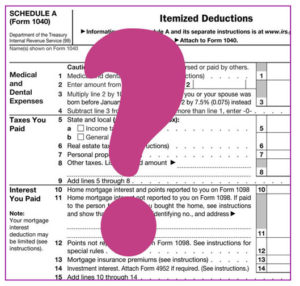How will the new tax bill affect war tax resisters (WTRs)? This is something we will all be learning by experience in the next couple years. One thing that is clear: the IRS is pretty overwhelmed by all the new work and continued budget cuts. That makes it harder for them to enforce collection (although personally, since I resist as a protest, I’d just as soon not be totally ignored).
So, for a first look, here are a few things that come to mind:
If you don’t file, you probably get to ignore the whole thing, at least as far as tax details and forms go, unless you’re a wage employee (see below). You might not ignore the fact that the legislation allows drilling for oil in the Arctic National Wildlife Refuge, and, of course benefits the rich and corporations over everyone else. In addition, the same people who pushed this through now want to go for cuts in Medicaid, Medicare, and Social Security — and probably every other human- and earth-positive program — so watch out.
 As far as health insurance goes, the media makes it sound like the Affordable Care Act/Obamacare is dead now, but it may be more like a slow death. The tax bill repeal of the individual mandate, requiring most everyone to have health insurance or pay a penalty, takes effect in 2019. What the bill actually does is zero out the penalty itself — starting in 2019. The penalty still applies for 2017 and 2018 at the same level: $695 per adult or 2.5% of household income in excess of tax filing thresholds, whichever is higher. For the 2017 tax filing season (starting in January), the IRS says they will reject tax returns that do not include health insurance information.
As far as health insurance goes, the media makes it sound like the Affordable Care Act/Obamacare is dead now, but it may be more like a slow death. The tax bill repeal of the individual mandate, requiring most everyone to have health insurance or pay a penalty, takes effect in 2019. What the bill actually does is zero out the penalty itself — starting in 2019. The penalty still applies for 2017 and 2018 at the same level: $695 per adult or 2.5% of household income in excess of tax filing thresholds, whichever is higher. For the 2017 tax filing season (starting in January), the IRS says they will reject tax returns that do not include health insurance information.
With all the publicity around the repeal, there will be widespread uncertainty about paying any penalties that might be applied. Up to now it seems the IRS has collected any fees owed from the delinquent’s income tax refund, if they had one coming. Other taxpayers have been billed for these amounts if they went unpaid, but we have not heard about the IRS applying enforcement actions stronger than sending letters.
For war tax resisters who file and refuse to pay, the doubling of the standard deduction and the elimination of the personal exemption, plus lowered tax rates, may affect your withholding or estimated tax payments during 2018. In order to be able to resist when you file 2018 taxes in 2019, try to do some rough calculations early in 2018 based on the new standard deduction ($12,000 single; $24,000 married) and the new tax rate (see tables in this useful article and try out one of the online calculators). If you are a salaried employee, the IRS expects to adjust withholding tables in February 2018, so watch the federal tax withholding on your paycheck stub and see if you need to adjust and resubmit your W-4 for the rest of 2018. If you pay estimated taxes but want to have federal income taxes to resist at the end of the year, you may need reduce your payments.
For war tax resisters who itemize and try to bring down their taxable income, you may face more changes. The bill eliminates a lot of  those itemized deduction categories on Schedule A, at least at levels that moderate income people have used to their advantage. With the standard deduction at $12,000, your itemized deductions would have to total more than that to be advantageous. This seems to be the major change toward simplifying the income tax system: eliminating deductions and getting more people to take the standard deduction. (There don’t seem to be significant changes to Schedule C.)
those itemized deduction categories on Schedule A, at least at levels that moderate income people have used to their advantage. With the standard deduction at $12,000, your itemized deductions would have to total more than that to be advantageous. This seems to be the major change toward simplifying the income tax system: eliminating deductions and getting more people to take the standard deduction. (There don’t seem to be significant changes to Schedule C.)
So, even though the bill keeps deductions for charitable contributions, retirement savings, and student loan interest, with the standard deduction at $12,000 in 2018, you may no longer find itemizing useful. One article points out that this may hurt smaller nonprofits who receive tax deductible small donations from many people. If taxpayers are not getting their charitable deduction, they may cut back on their giving. (Since NWTRCC is not a 501(c)3, feel free to keep giving to us directly!).
There are a lot more details about the tax changes that we will be learning over time, and there is probably a lot more that I could write about now, but this is getting long so I’ll call it quits for now. Please use the comment section below to correct anything I got wrong, add more information, or ask questions. Remember that we are not tax preparers, but we do try to follow changes that will affect people in the war tax resistance network.
— Post by Ruth Benn
P.S. We will be revising our literature in light of the new law as needed, but please help us by sending an email if you see something outdated or wrong on our website. Thanks.

Thank you, Ruth!
Thanks for the information. 2017 is the first tax year I am intentionally under the Taxable Level. So no Federal, State, or FICA taxes since I have retired early. Hopefully, the new tax laws will do the same or better for me.